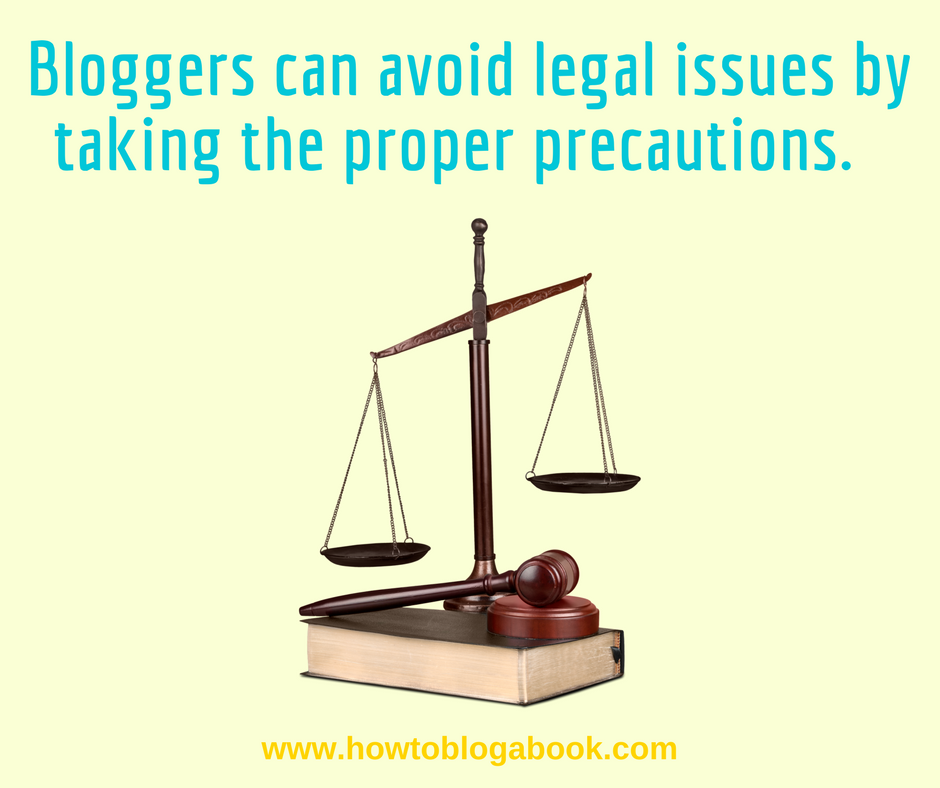From a legal perspective, are you at risk? Or is your blog or book a potential source of legal problems?
Every day, authors and bloggers must consider the legality of their work. As you dig deeper into the world of writing and publishing—online or off—you might have to tackle many legal issues.
Copyright Laws, licenses, trademarks, publishing regulations…the list goes on. These subjects can be overwhelming, especially if you are new to the business of writing.
I have personally spoken to many authors and bloggers who argue that they write creatively and originally. Since they don’t copy anyone or anything, legal issues don’t matter to them.
That might be true…or not.
In the real-world, legal matters are much more important and pervasive than you may think. Knowing them well in advance will keep you and your work safe and hassle-free.
With that in mind, here are some legal snares you should know about if you want to become a successful author and blogger.
1. Use Media Wisely
These days, most online content is secured by a copyright protection. In other words, you are not allowed to use the videos, music, posts, articles, and images published on other sites as you wish. To use them, you have to get permission or at least provide attribution.
Specifically, if you are hunting for images—as bloggers often do, there are several options that prevent you from copyright infringement or using an image without permission. For instance, you can buy stock photos with proper licenses, take your own photographs, or even hire photographers.
Many bloggers prefer to find photos with creative commons licensing, which enables them to share content with attribution. And many image sites provide free or low-cost images for use online.
2. Be Aware of Sharing Rules
It is crucial to do your homework and study the different ways to cite someone else’s work and kinds of licensing. While you may deem what you are doing “sharing,” the creator of the work may see it stealing or publishing their work under your name. Know how to attribute whatever content you share that is not your own.
Copyright rules are more complicated than what you may expect. For example, self-publishers, traditionally published authors, journalists, and bloggers must know how to quote sources. There are word limits on how much content you can include from another source even with attribution. Sometimes you need to pay for permission to use the content.
If you fail to follow the rules, your work could fall under the “plagiarized” category or worse.
One way to stay away from that risk is to include links to sources and paraphrases. Also, properly credit all quotes.
3. Copyright Your Content
Of course, you should protect your own work—posts, articles, books, and images with a copyright. This is a no-brainer.
You can’t copyright every blog post, but you can submit batches of posts to the copyright office.
Be sure you have a copyright notice on your website and that you or your publisher submits your work for copyright in your name.
4. Beware of Privacy Laws
Privacy laws can generate problems for bloggers—but lack of privacy statements on your site can be even worse.
Many blogs offer contact information to help visitors contact the writer—you. However, you must be aware that you cannot use the names of email addresses of those who approach you in this way to create a mailing list. Nor can you sell or reveal email addresses or names of people without permission.
On the positive side, privacy law protects you as well. For an author or blogger, adopting and posting a privacy policy on your site may be extremely helpful. You can read the policies of different sites to see what is appropriate or commonly used.
5. Revealing Sources
I hope you are never put in the position of needing to protect a source you used for a book or blog post. Sadly, Shield Laws differ when it comes to protecting bloggers, authors, and journalists. Adding insult to injury, the laws vary from one region to another.
It is best to seek an attorney’s help if you are forced to reveal a source and are unwilling to do so. But beware! Trying to protect a source can mean more significant legal issues on the horizon.
6. Disclose Endorsements and Affiliate Promotions
Unfortunately, many bloggers and authors are unaware of the fact that you must reveal affiliate promotions or endorsements.
The rule is simple: If you are endorsing a product, you must disclose it. To be precise, if you are being paid to review, use, or promote a service or product on your blog, you must say so.
Why? It’s very simple.
Any promotional mention is an advertisement. And you need to educate your visitors that it’s an advertisement.
Remember: This also applies to affiliate links you may be using in your posts or emails. Many bloggers make money by becoming affiliates and then promoting other bloggers’ products or services. This is an excellent income source—but let your readers know you are getting paid in some manner for this.
7. Avoid Libel
Libel is one of the most important legal issues for writers to understand. If you publish people’s life stories or personal life pieces, you must abide by libel rules.
If you intend to write unverifiable true stories, think long and hard about your approach. You could be sued if your facts aren’t correct or you can’t prove that they are correct.
The solution is simple. Stick to verifiable information and never go solely on instinct or opinion, especially when publishing facts or stories about famous people.
8. Trademarks
Before naming your book or blog, pause. Check if anyone else has already used the name and trademarked it.
If you use a trademarked name, you could lose a domain or the rights to a book or any property online.
The extra time you spend to research trademarks and, if necessary, invent a unique, creative, and never-used-before name for your site or book is worth it.
Writing is a creative profession. The last thing you want as an author or blogger is to battle court cases related to the content you publish. So invest time in learning the potential legal risks surrounding your profession. Or when in doubt, contact a lawyer with your questions…before you write or publish a word.
Do you have any experiences with legal issues related to your blog? Tell me in a comment below about them.
About the Author
 Sanjay Bojan is a blogger and researcher who contributes on various high profile sites including Forbes, Huffington Post, and TechCrunch. For writing wok and brand promotion, you can contact him at sanjay.bojan2@gmail.com.
Sanjay Bojan is a blogger and researcher who contributes on various high profile sites including Forbes, Huffington Post, and TechCrunch. For writing wok and brand promotion, you can contact him at sanjay.bojan2@gmail.com.


Thanks for the post, Nina. helpful, as were a couple of the “more info” sites at the end.
copyright infringement is common these days. Thanks for the post